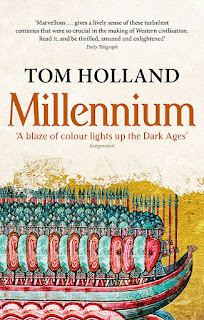I Read Books: Millennium
Millennium
Tom Holland (not the Spider-Man actor) makes the case that 10th and 11th Century Europe went through a revolution. Or several revolutions. Revolutions that created many of our ideas of the middle-ages, and wiped away some others.
For example: castellation. Warlords would head into an area and put up a castle, claiming the land and the people who lived on it, taking taxes from them, forcing them to move from scattered farms to centralised villages under the eye of knights and stewards.
Religion. This is a theme that returns again and again in the book, as Holland puts together his case for their being a millennial expectation for the year 1000, or 1001, or 1033. Officially the church said but of that day and hour knoweth no man, no, not the angels of heaven, but my Father only yet the fact that they had to keep saying that, again and again, and that despite that there were revivals, visions, changes (the first executions for heresy happened in these years) all point to the fact that some people were convinced something was up.
Anyway, there’s a lot of different themes he picks up and puts down again. Holland tells us a good solid story, or rather a bunch of good solid stories, leaving the quibbles and hedging (because history, especially popular history, is in the interpretation) to the notes. Which is fine, but don’t think that the story, even the best story, is all there is.
Read This: For an entertaining introduction to the history of 10th and 11th Century Europe (with many dips into earlier eras where needed for context, especially the Carolingian Empire)
Don’t Read This: If you want full examinations of alternative explanations to events and trends.
Tom Holland (not the Spider-Man actor) makes the case that 10th and 11th Century Europe went through a revolution. Or several revolutions. Revolutions that created many of our ideas of the middle-ages, and wiped away some others.
For example: castellation. Warlords would head into an area and put up a castle, claiming the land and the people who lived on it, taking taxes from them, forcing them to move from scattered farms to centralised villages under the eye of knights and stewards.
Religion. This is a theme that returns again and again in the book, as Holland puts together his case for their being a millennial expectation for the year 1000, or 1001, or 1033. Officially the church said but of that day and hour knoweth no man, no, not the angels of heaven, but my Father only yet the fact that they had to keep saying that, again and again, and that despite that there were revivals, visions, changes (the first executions for heresy happened in these years) all point to the fact that some people were convinced something was up.
Anyway, there’s a lot of different themes he picks up and puts down again. Holland tells us a good solid story, or rather a bunch of good solid stories, leaving the quibbles and hedging (because history, especially popular history, is in the interpretation) to the notes. Which is fine, but don’t think that the story, even the best story, is all there is.
Read This: For an entertaining introduction to the history of 10th and 11th Century Europe (with many dips into earlier eras where needed for context, especially the Carolingian Empire)
Don’t Read This: If you want full examinations of alternative explanations to events and trends.


Comments